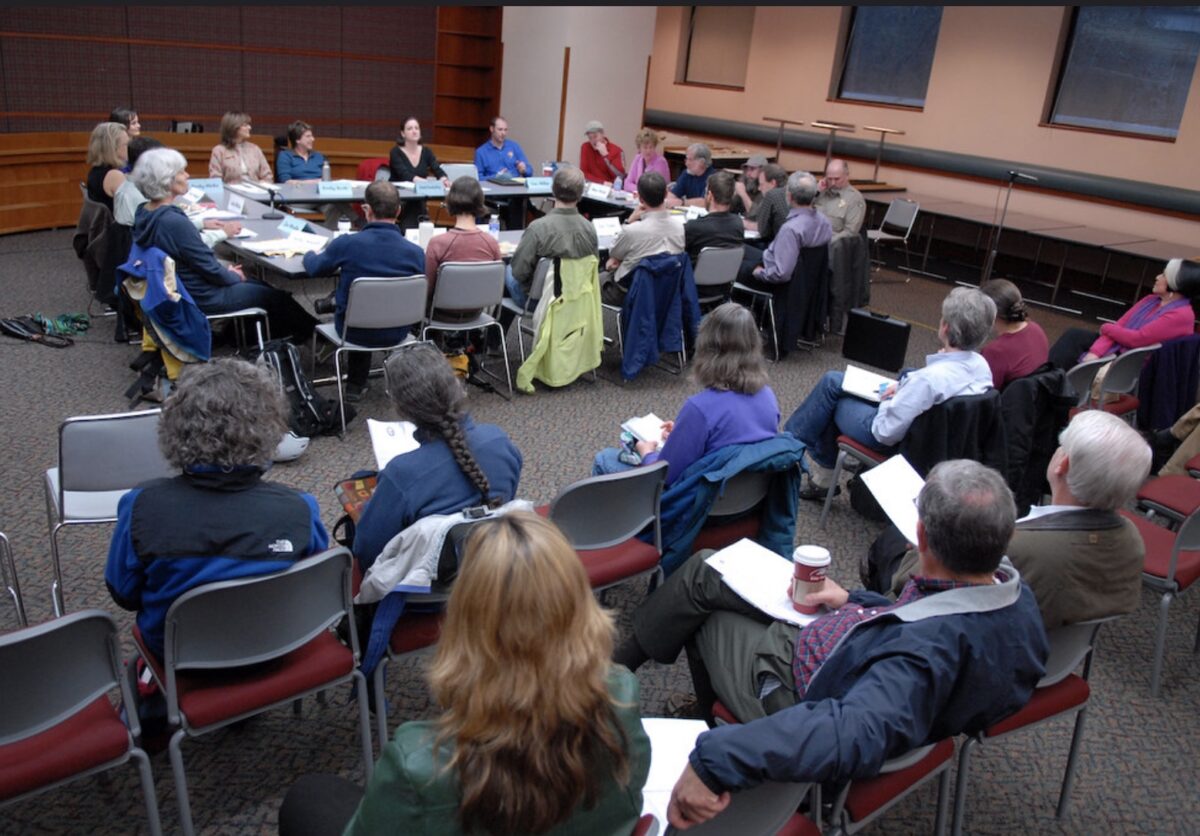
(Photo: Jonathan Maus/BikePortland)
“Use committees as an opportunity to work on the inside, with an outside lens.”
— Vivian Satterfield, Verde
Our state and region are awash in transportation-related committees. Advisory groups, working groups, commissions, advisory committees — you name it, we’ve got it. There are probably over 100 committees between the Oregon Department of Transportation, Metro, City of Portland and Multnomah County alone.
A panel at this morning’s Oregon Active Transportation Summit (hosted by The Street Trust) took a closer look at committees with an eye toward redistributing power.
The conversation was moderated by Maria Sipin, a former ODOT employee who has a long career in community organizing in the public health and transportation fields and now works with the nonprofit Safe Routes National Partnership. As someone born in the Philippines, she expressed frustration with being asked to sit on various government committees, “as a token member to satisfy checkboxes” or being part of ones that, “are just some symbolic assembly of people that might not have a whole lot of power in the end.”
To delve more into these issues, Sipin brought together two young community organizers who sit on a lot of committees, as well as a more veteran leader in the transportation space.
Advertisement
Lillyanne Pham, 24, has sat on many PBOT and ODOT committees over the years and currently works with Historic Parkrose, a neighborhood prosperity initiative. She came up with a dozen questions (below) she wishes every government staffer would consider before they create a new committee. The questions ranged from technical things like whether or not they can pay for members’ time to more existential questions like, “Why do we need [blank] committee?”
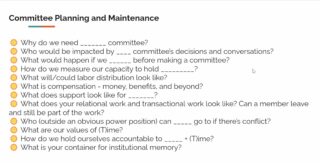
Vivian Satterfield with community development nonprofit Verde NW, has a decade of experience in Portland working on environmental and transportation justice issues and was recently featured in a New York Times article. One of the big lessons she’s learned about how to get the most out of time served on committees is to see them as an, “opportunity to work on the inside with an outside lens.” “Don’t be too navel gazing and focused on only what the committee’s goals may be, because it must serve a larger purpose.”
Advertisement
Asked what government and agency staff could do to make committees work bretter, Danny Cage, a young organizer who came up through the Sunrise PDX and counts as his most recent victory the Portland Public Schools Climate Policy he helped shepherd into existence, said he was a bit intimidated by all the “fancy words” he heard at first. “I did not know what at ‘FTE’ or a foundation even was two years ago.” “There are a lot of times people are too afraid to ask what something means. I am not afraid to constantly stop and be like, ‘Can you explain this? What does this mean? Give me the large picture of what we’re talking about’.”
Hosting events in the community, hosting meetings at more accessible times and places, and partnering with younger people in culturally specific communities were just some of the advice from panelists on what could make committees better.
And Satterfield had perhaps the most important takeaway for any agency staffers listening in: “Not everything has to be a committee.”



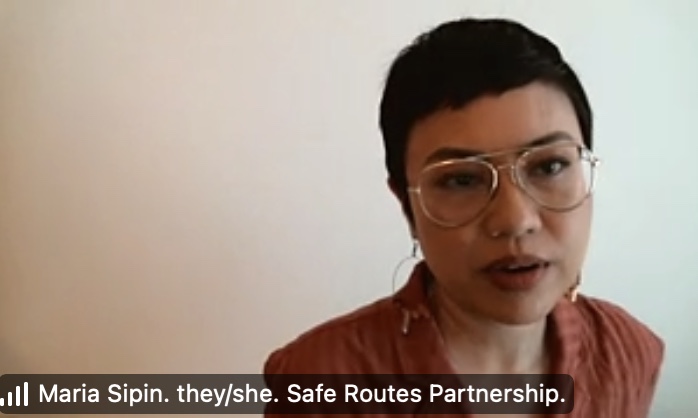



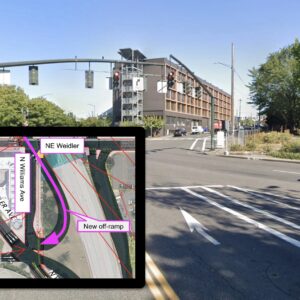
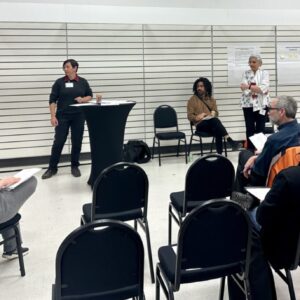


Thanks for reading.
BikePortland has served this community with independent community journalism since 2005. We rely on subscriptions from readers like you to survive. Your financial support is vital in keeping this valuable resource alive and well.
Please subscribe today to strengthen and expand our work.
Fascinating story in the WSJ a week or so ago about the two nations very likely to undergo internal collapse are Russia and the United States. Russia because of its totally corrupt dictatorship and looted economic structure. The U.S. because of its divided and moribund political system, and crumbling institutions that increasingly work only for wealthy interests. Wouldn’t it be a hoot if the U.S. and Russia swapped places. The U.S. becomes some kind of dictatorship as Russia goes democratic. Stay tuned!
***Please avoid one line negative comments with no content. – the Moderator ***
Does this censorship policy also apply to derogatory comments directed towards conservatives and their ideals?
Hi Frank,
We don’t think in terms of labels around here. People are their ideas and opinions, they are not a label in my opinion. We moderate around respect, decency, and whether or not a comment adds value to the discussion. Thanks.
As someone who staffs and sits on several committees, they are kind of a waste of time. Often there is no real power to the committee and it serves to pass information along to constituencies. From the staff side, I often can’t get good feedback from non-experts on a committee (when talking about technical issues, not community values), but my policy body won’t do anything unless several committees have weighed in.
At least in Portland, a single transportation committee would be excellent. Combine the BAC, PAC, FAC and related budgetary committees into a single thing.
The 1944 CIA field manual on how to sabotage an organization:
This is a neat graphic full of valid points, but there was no CIA in 1944 (it was created by the National Security Act of 1947, formalizing Truman’s Central Intelligence Group, which he unilaterally created in 1946).
Ha! I can think of a few neighborhood association members who must’ve taken this page to heart.
There are probably committees that end up being useless. But you can point to all sorts of major decisions that have changed dramatically under the pressure of the “experts” having to explain to people who don’t already share their experience and assumptions. The point of advisory committees is not to serve the committee members, its for them to serve the community.
BTW, I don’t think the CIA existed in 1944 but if it did it wasn’t writing manuals about how to disrupt meetings. It was working with the resistance to defeat Japan and Germany. If they wanted to disrupt a meeting it was more likely to train people in the use of hand grenades.
The CIA predecessor was the Office of Strategic Services (OSS), which was active in 1944:
https://en.wikipedia.org/wiki/Office_of_Strategic_Services
Yeah, seems to me more like something the FBI would’ve rolled out in the 50s.
One other thought. The only power of advisory committees is the wisdom of their advice and their ability to persuade. For people who see their membership on one as a source of personal power they are inevitably a frustrating disappointment. And usually not frustrating only for them.
You get out of committees what you put into them. Most people act like sheep on committees (baah baah, I don’t understand baah I won’t say anything becaahse I don’t waant to maake waaves) because they put nearly nothing into them, just time and a warm bum. I find committees wonderful opportunities to manipulate others and agencies to get what I think my community needs, be it the community I live in or the one I associate with (for example, bicyclists who use bicycles for transportation).
Democracy is a messy imperfect process, and committees/commissions/authorities are necessary evils within the inequitable structures of functioning democracies.
I put this out there because I don’t know . . .
But let’s say back in the 60s and 70s did nothing get done in Portland because they didn’t use a lot of committees? Were our elected officials not able to make the decisions and choices we elected them to do like they can’t seem to now?
Democracy is a great thing, don’t get me wrong, but when too much process is added, and the feeling that you have to have 100% buy in on every decision puts up massive roadblocks to getting anything done.
We elect folks to make those decisions for us. We elect those that support the ideas we support. Do they do everything we agree with? I highly doubt it. But I’d hope the politicians I elect can do at least do many of the things I agree with. And well, if they don’t, I don’t vote for them next time.
Just my 1/2 cent.
David, your eternal optimism is confounding. If something clearly doesn’t work – and clearly the committee system doesn’t work – why keep putting energy into it, especially when it allows the gov’t to say “We involved you so quit complaining!”
…because all the alternatives are so much worse?…
I don’t. I value having input in decisions that impact me and the infrastructure I depend on. I don’t believe that decision makers somehow know everything about every situation, and that there is considerable value in having a mechanism for informing them of important factors they may have overlooked.
I want input on decisions like the Rose Quarter expansion or the CRC megaproject, or even the placement of a bike rack in front of my shop. It may be less efficient than simply rolling over the people with “we know best”, but that’s a price I’m willing to pay.
Then why bother electing anyone? Let’s setup a website (or something) where we can put all issues out there and if 51% of the people vote yes then you get your bike rack, or if 51% vote no you don’t. Seems fair right?
Elections are so last century.
I’m not proposing direct democracy; getting feedback and listening to stakeholders is something good leaders should do.
Should we go ahead and build Keystone XL because we elected a leader who thought it was a good idea? Should ODOT and Metro move forward with their I-5 megaprojects without getting input? Of course not.
There is a middle ground between voting on everything and ignoring the public because “I got elected”.
There is also the issue of who controls what it is that is being decided and who is controlling that discussion. 99% of government decisions are made by bureaucrats, not by elected officials nor by the populace (We the people…) How do you control your bureaucracy? Elected officials are effectively impotent, voters irrelevant. So then I as an unelected committee member and nearly irrelevant voter then have certain opportunities to lobby bureaucrats in a way that elected officials cannot or will not. I can either be passive and achieve nothing, or I can be active and maybe achieve something…
I agree, it’s not perfect, and it is certainly not democratic, but generally you can’t change anything if you don’t try to.
And that is the whole point of these boring dull committees, to lobby bureaucrats on behalf of whomever you think you are representing, in a highly imperfect over-structured corrupt system that has only a vague resemblance to the “democracy” we learned about in school.
Don’t sell yourself short. I think it is at least a 5¢ opinion. And I agree.
Sounds like we need a committee to determine if there needs to be a committee
My experience of committees – and most other public-involvement processes in Oregon – has convinced me that they provide The Illusion of Inclusion™.
They allow the gov’t entity to say “We involved you” when in fact they have no obligation to do anything at all with your input.
Sorry to sound so cynical, but I think the young people JM interviewed rightly see through the charade.
I stopped sitting on committees because I saw staffers ignoring my input and providing support to members who hold their same view. Support for committee members was disproportionately given to members who represented government agencies or old school non profits. If you are a member ‘at large’ you input will be largely ignored.
I had a committee support my freeway management principles but lift absolutely zero fingers to elevate these methods or my voice to other boards and committees. It was expected that I do all that work on my own, when everybody else was leaning on their organizations for support, paychecks and access to other committees.
Furthermore I was expected to take the lead with zero follow up support from either the committee or the staff members. You can see this in the uneven support provided to some members and not others.
Frankly it’s a waste of time used to distract and placate community members into thinking their input matters but at the end of the day nothing gets done. Either my skin color wasn’t dark enough to be POC or my Ivy League degree and intelligence intimidated everybody in the room.
As a 5th generation Oregonian it is maddening to watch newcomers to Oregon get more support then long time residents with historical knowledge. Oregon is the dumping ground of people running away from their problems back east. That is not the type of leadership we need.
“Oregon is the dumping ground of people running away from their problems back east.”
It’s odd, but here in Greensboro we feel exactly the same about NC being the dumping ground of people from West Coast states, particularly all those uppity people moving in recently from Portland Oregon, bidding up the prices of homes here…
“Oregon is the dumping ground of people running away from their problems back east”
remittance man
noun
An unwanted or underachieving man, or occasionally a youngest son, sent by relatives to a distant land and sent regular remittances of upkeep money, in order that he doesn’t come back.an exile living on money sent from home – Wiktionary
Portland was full of them in the 1800s. Plus ca change?
Many of the people in the government agencies and in the “old school non-profits” also switch chairs every few years or so.